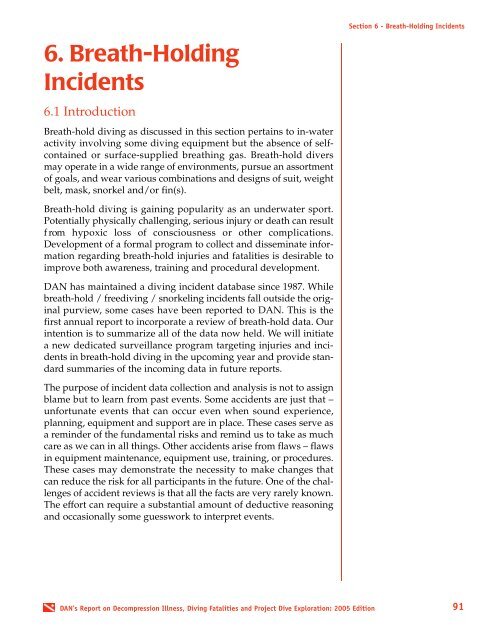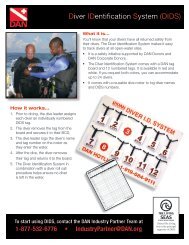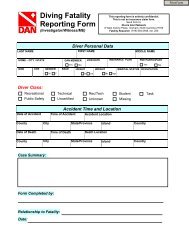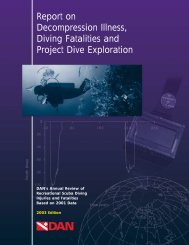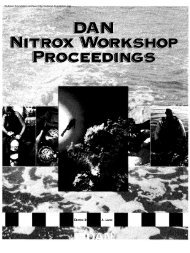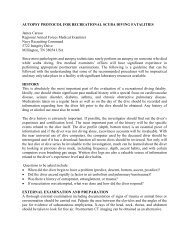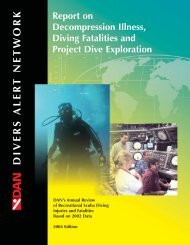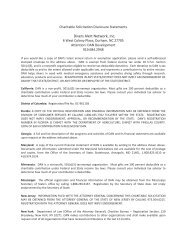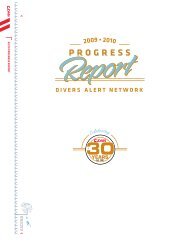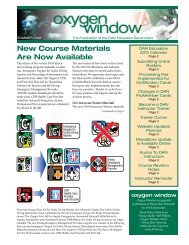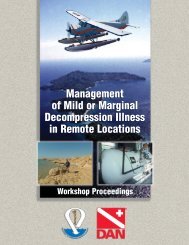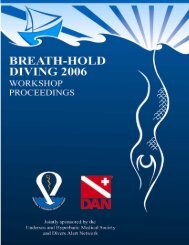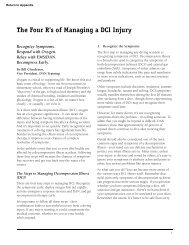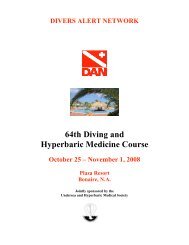Report on Decompression Illness, Diving Fatalities and Project Dive
Report on Decompression Illness, Diving Fatalities and Project Dive
Report on Decompression Illness, Diving Fatalities and Project Dive
- No tags were found...
Create successful ePaper yourself
Turn your PDF publications into a flip-book with our unique Google optimized e-Paper software.
6. Breath-HoldingIncidents6.1 Introducti<strong>on</strong>Breath-hold diving as discussed in this secti<strong>on</strong> pertains to in-wateractivity involving some diving equipment but the absence of selfc<strong>on</strong>tainedor surface-supplied breathing gas. Breath-hold diversmay operate in a wide range of envir<strong>on</strong>ments, pursue an assortmentof goals, <strong>and</strong> wear various combinati<strong>on</strong>s <strong>and</strong> designs of suit, weightbelt, mask, snorkel <strong>and</strong>/or fin(s).Secti<strong>on</strong> 6 - Breath-Holding IncidentsBreath-hold diving is gaining popularity as an underwater sport.Potentially physically challenging, serious injury or death can resultf rom hypoxic loss of c<strong>on</strong>sciousness or other complicati<strong>on</strong>s.Development of a formal program to collect <strong>and</strong> disseminate informati<strong>on</strong>regarding breath-hold injuries <strong>and</strong> fatalities is desirable toimprove both awareness, training <strong>and</strong> procedural development.DAN has maintained a diving incident database since 1987. Whilebreath-hold / freediving / snorkeling incidents fall outside the originalpurview, some cases have been reported to DAN. This is thefirst annual report to incorporate a review of breath-hold data. Ourintenti<strong>on</strong> is to summarize all of the data now held. We will initiatea new dedicated surveillance program targeting injuries <strong>and</strong> incidentsin breath-hold diving in the upcoming year <strong>and</strong> provide st<strong>and</strong>ardsummaries of the incoming data in future reports.The purpose of incident data collecti<strong>on</strong> <strong>and</strong> analysis is not to assignblame but to learn from past events. Some accidents are just that –unfortunate events that can occur even when sound experience,planning, equipment <strong>and</strong> support are in place. These cases serve asa reminder of the fundamental risks <strong>and</strong> remind us to take as muchcare as we can in all things. Other accidents arise from flaws – flawsin equipment maintenance, equipment use, training, or procedures.These cases may dem<strong>on</strong>strate the necessity to make changes thatcan reduce the risk for all participants in the future. One of the challengesof accident reviews is that all the facts are very rarely known.The effort can require a substantial amount of deductive reas<strong>on</strong>ing<strong>and</strong> occasi<strong>on</strong>ally some guesswork to interpret events.DAN’s <str<strong>on</strong>g>Report</str<strong>on</strong>g> <strong>on</strong> Decompressi<strong>on</strong> <strong>Illness</strong>, <strong>Diving</strong> <strong>Fatalities</strong> <strong>and</strong> <strong>Project</strong> <strong>Dive</strong> Explorati<strong>on</strong>: 2005 Editi<strong>on</strong> 91


